Table of Contents
What is real?
We all think we know. But do we? This isn’t an argument in favor of nothing being real. On the contrary. It’s simply that knowing what is real and what is not can be difficult to suss out. Knowing that this barrier exists is perhaps the beginning of true wisdom.
There’s the small matter of cognitive biases, those well-established and attested brain blocks that make us think we know the score when we really don’t. Cognitive biases often have us seeing what we have trained ourselves to see rather than what is actually there.
When all you have is a hammer, all you see is nails.
Related, but not entirely distinct from this, are our emotions and our ego, which often have us seeing what makes us feel good rather than what is actually there. These can be just as vicious on rationality as the more objective cognitive biases, if not more. It is difficult to confront reality when reality is hurtful to us. And yet we must.
Rationality is a powerful tool that all those seeking self-actualization must employ if they wish to rise above. There are few things more damaging to our own success than being unwilling or unable to see reality for what it is and to deploy reason to extrapolate meaning from that.
These quotes all underscore the importance of both knowing what is real and understanding it rationally.
Upton Sinclair
“It is remarkably difficult to make a man understand something when his salary depends upon his not understanding it.”
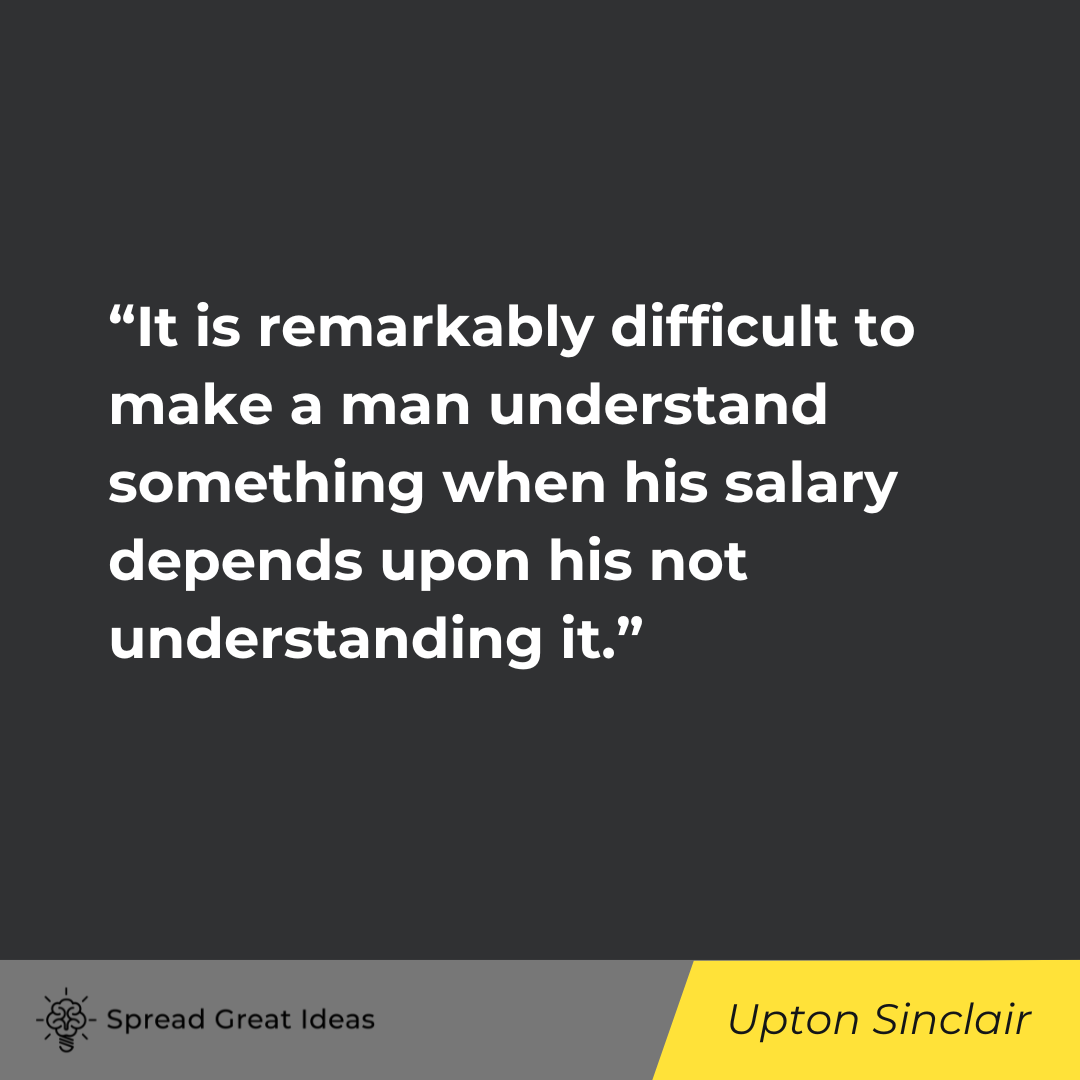
Upton Sinclair’s quote encapsulates the inherent challenge of confronting individuals whose livelihoods are tied to maintaining ignorance. Whether in politics, business, or any profession, people often resist comprehending inconvenient truths if acknowledging them threatens their financial stability. This sentiment underscores the power dynamics at play in society, where self-interest can overshadow rationality and truth. Sinclair’s observation serves as a cautionary reminder of the obstacles to progress posed by entrenched interests and the importance of cultivating a culture that values understanding and truth over personal gain.
George Carlin
“It turned out I was pretty good in science. But again, because of the small budget, in science class we couldn’t afford to do experiments in order to prove theories. We just believed everything. Actually, I think that class was called Religion. Religion class was always an easy class. All you had to do was suspend the logic and reasoning you were being taught in all the other classes.”
– George Carlin, Brain Droppings
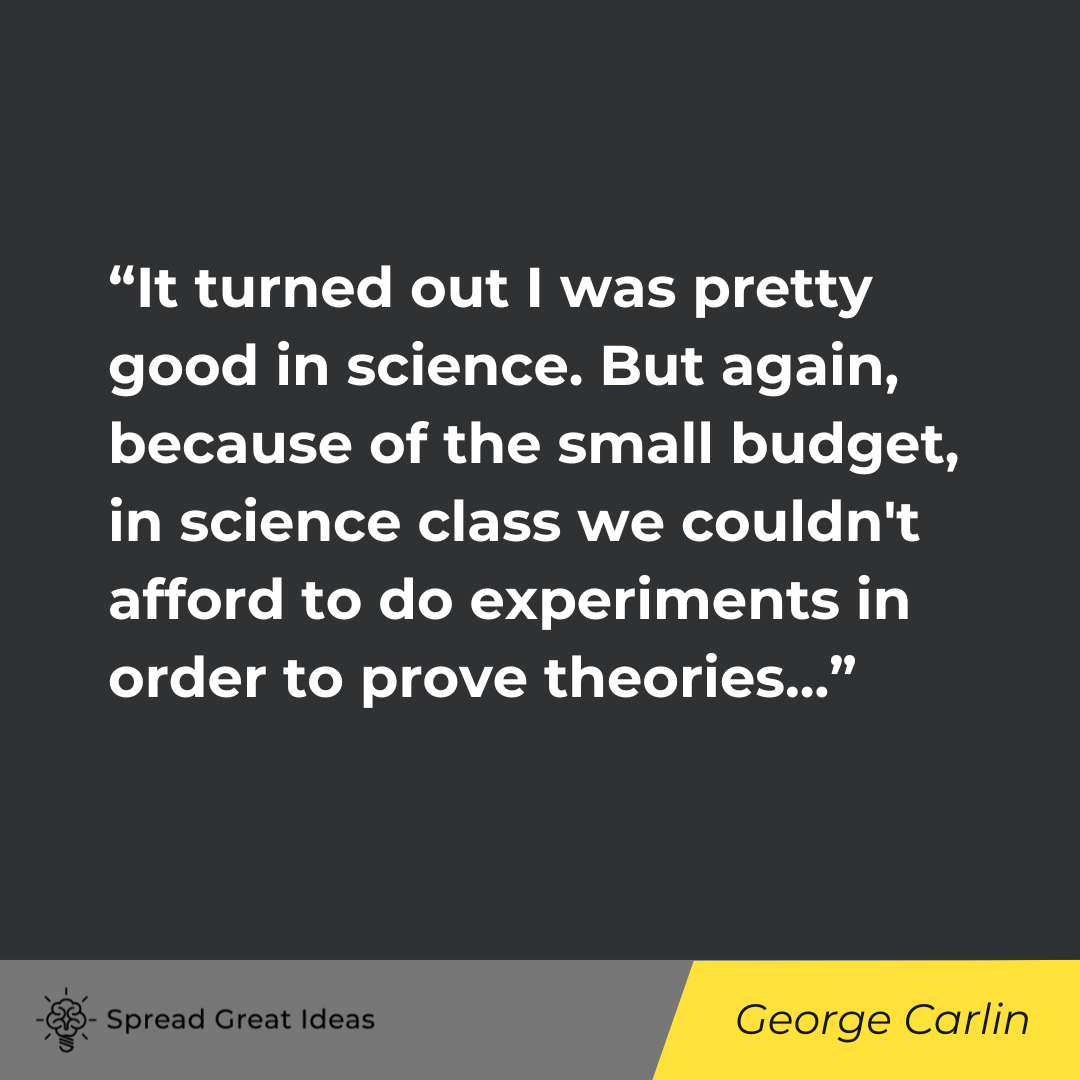
In this witty remark from George Carlin’s “Brain Droppings,” he highlights the irony of his educational experience where the lack of resources in science class led to a reliance on blind acceptance akin to religious faith. Carlin humorously juxtaposes the rigor of scientific inquiry with the ease of religious instruction, suggesting that critical thinking takes a backseat in the latter. By equating his science class with a religion class, he satirizes the educational system’s shortcomings in fostering genuine understanding and critical analysis. Carlin’s observation serves as a humorous critique of the limitations and contradictions within formal education.
E.B. White
“I have yet to see a piece of writing, political or non-political, that doesn’t have a slant. All writing slants the way a writer leans, and no man is born perpendicular, although many men are born upright.”
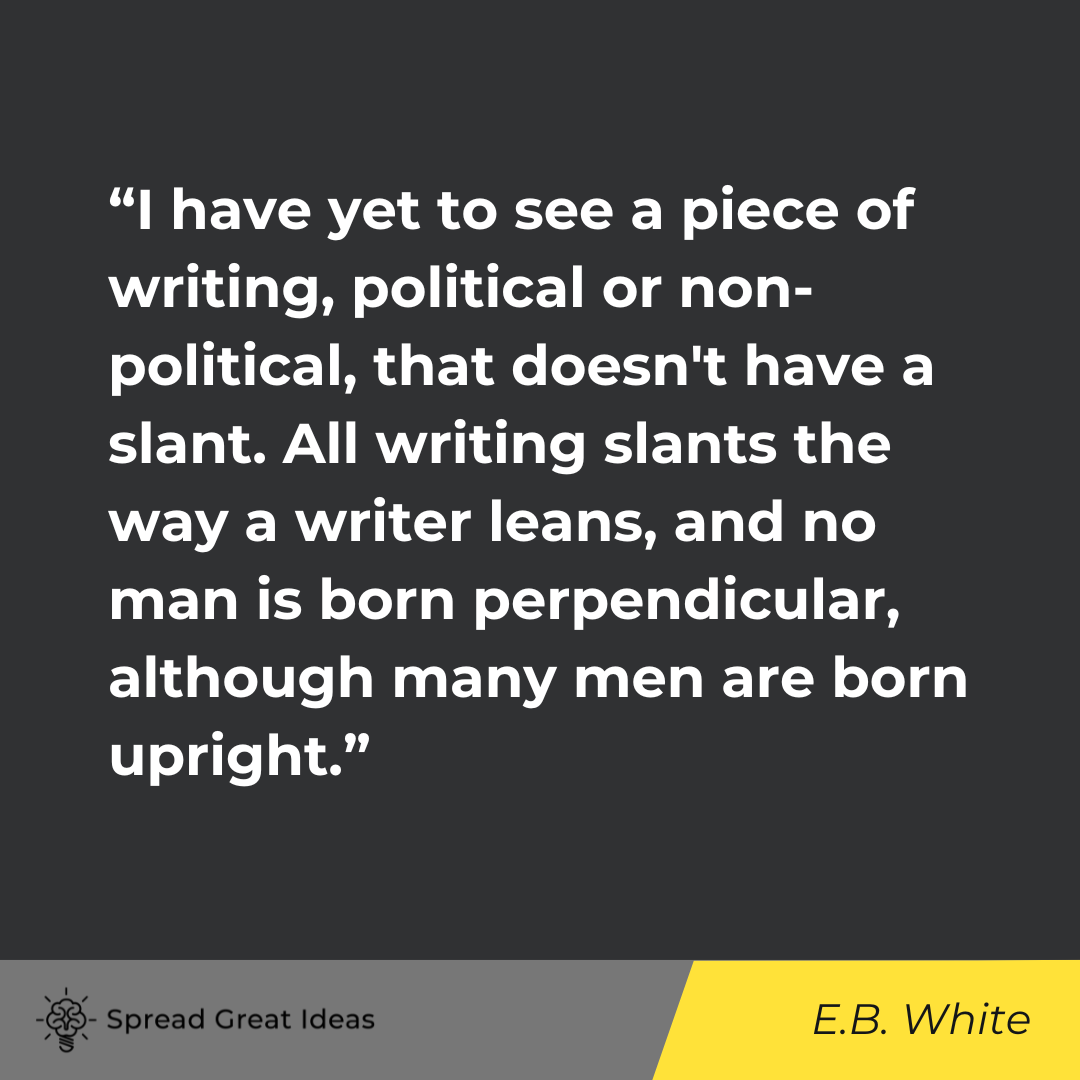
E.B. White’s astute observation underscores the inherent subjectivity in all forms of writing. Whether political or non-political, every piece of writing reflects the biases, perspectives, and leanings of its author. White cleverly compares writing to a person’s posture, suggesting that just as no one is perfectly upright, no piece of writing is entirely unbiased. Instead, every writer inherently leans towards a certain viewpoint or interpretation. This insight challenges readers to approach all written content with a critical eye, recognizing that even seemingly objective texts carry the imprint of the author’s perspective. White’s quote serves as a reminder of the nuanced nature of communication and interpretation.
Dale Carnegie
“When dealing with people, remember you are not dealing with creatures of logic, but with creatures bristling with prejudice and motivated by pride and vanity.”
– Dale Carnegie, How to Win Friends and Influence People
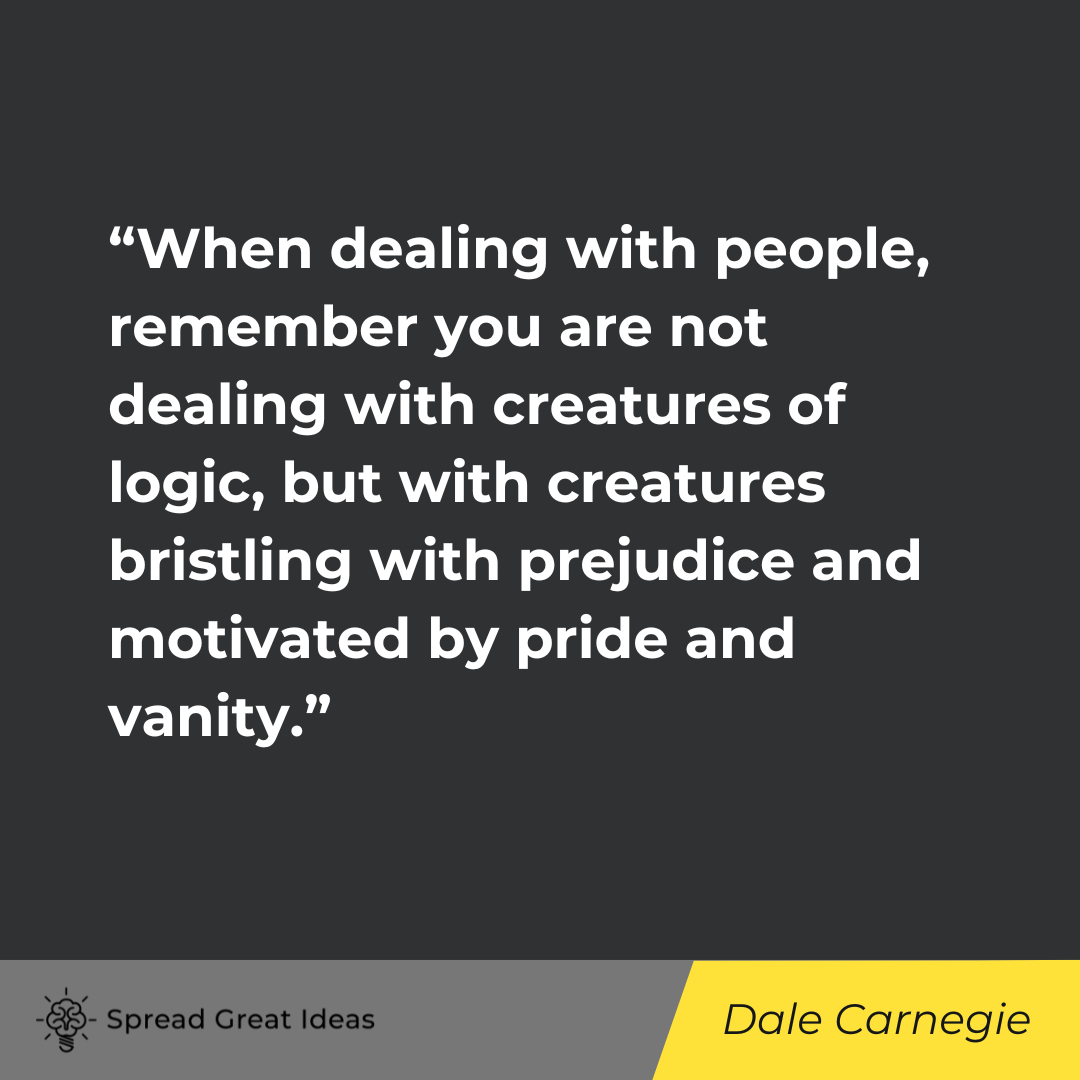
Dale Carnegie’s quote from “How to Win Friends and Influence People” offers a profound insight into human nature and interpersonal dynamics. He emphasizes the importance of understanding that people are not purely rational beings but are instead influenced by emotions, biases, and ego. By acknowledging the prevalence of prejudice, pride, and vanity in human interactions, Carnegie highlights the necessity of empathy and tact in navigating relationships. This perspective encourages individuals to approach communication with sensitivity, recognizing and respecting the complex motivations and vulnerabilities of others. Carnegie’s words serve as a timeless reminder of the importance of emotional intelligence in fostering positive connections.
Niccolò Machiavelli
“Men judge generally more by the eye than by the hand, for everyone can see and few can feel. Everyone sees what you appear to be, few really know what you are.”
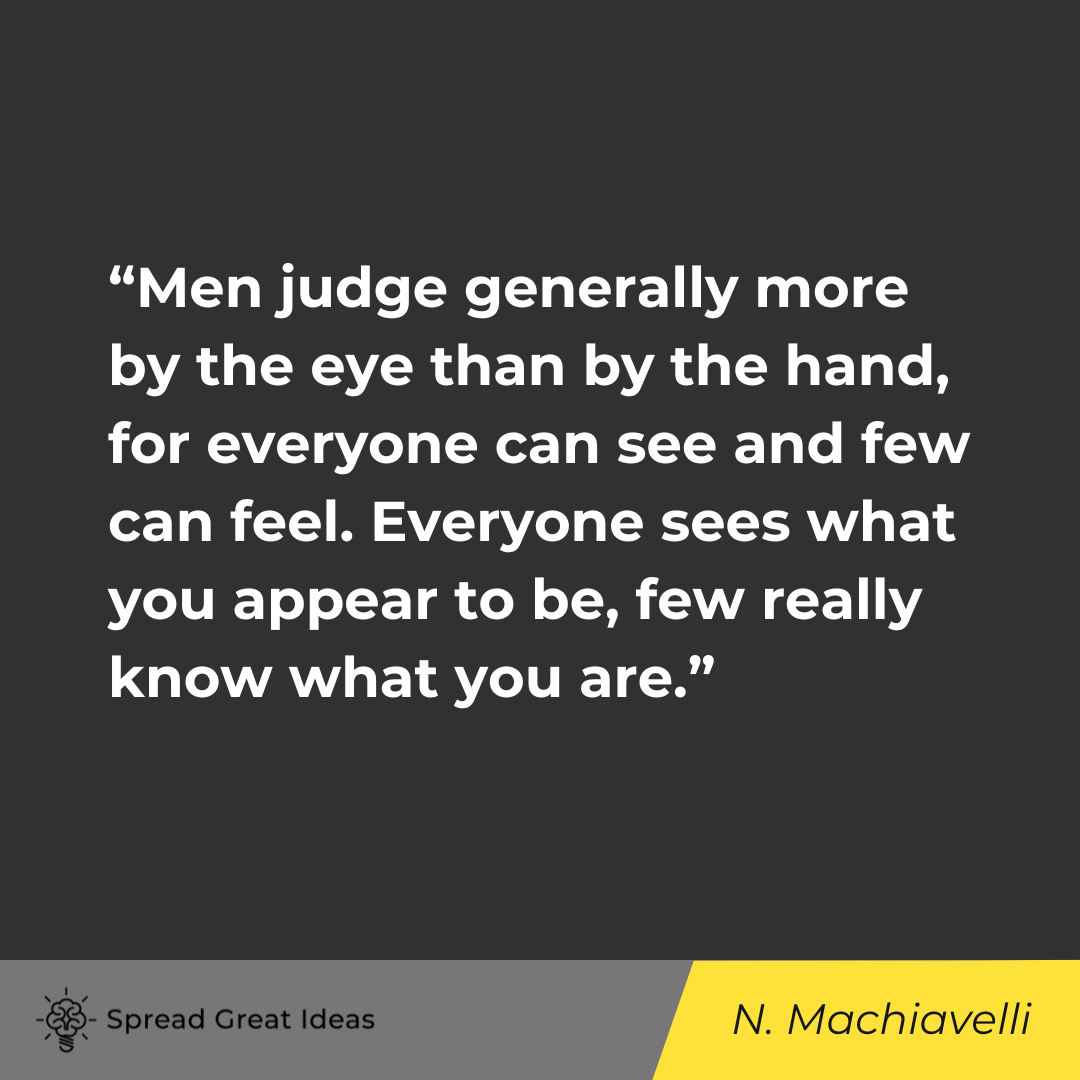
Niccolò Machiavelli’s quote encapsulates the human tendency to rely on superficial appearances rather than deeper understanding. He observes that people often judge based on outward appearances because it’s easier to perceive than to truly understand someone’s character or intentions. Machiavelli highlights the disparity between perception and reality, suggesting that while everyone can see the surface image, few possess the insight or empathy to grasp the complexities beneath. This insight serves as a caution against making hasty judgments and underscores the importance of looking beyond mere appearances to gain a deeper understanding of others.
Friedrich Nietzsche
“How pleasant is the sound of even bad music and bad motives when we are setting out to march against an enemy!”
– Friedrich Nietzsche, Daybreak: Thoughts on The Prejudices of Morality

In this quote from “Daybreak: Thoughts on The Prejudices of Morality,” Friedrich Nietzsche reflects on the power of unity and purpose in shaping perception. He suggests that even when confronted with inferior music or questionable motives, the collective spirit of rallying against a common foe can imbue such elements with a sense of pleasantness. Nietzsche acknowledges the emotive influence of solidarity, where the shared endeavor to confront an adversary can transform even negative aspects into sources of inspiration or comfort. This observation underscores the psychological dynamics at play during times of conflict, emphasizing the human capacity to find solace and motivation amidst adversity.
Mark Twain
“In religion and politics people’s beliefs and convictions are in almost every case gotten at second-hand, and without examination, from authorities who have not themselves examined the questions at issue but have taken them at second-hand from other non-examiners, whose opinions about them were not worth a brass farthing.”
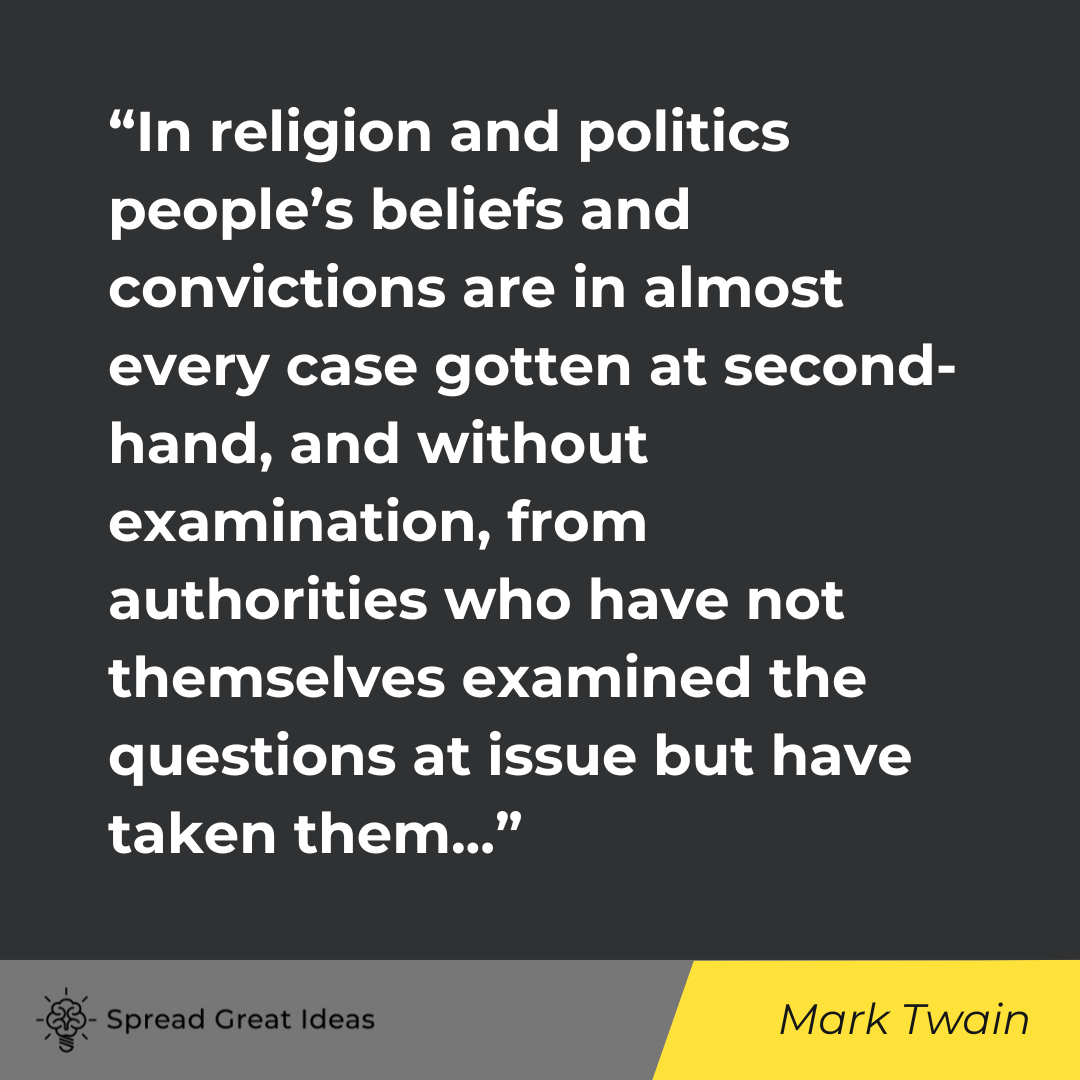
Mark Twain’s quote perceptively dissects the foundations of belief systems in religion and politics. He contends that many individuals adopt their convictions without critical examination, instead relying on authorities who have not scrutinized the issues themselves. Twain highlights the pervasive nature of second-hand beliefs, transmitted uncritically through a chain of non-examiners. By asserting that such opinions hold little value, he challenges readers to question the origins and validity of their own convictions. This observation serves as a caution against intellectual complacency and blind adherence to authority, urging individuals to engage in independent inquiry and critical thinking.
George Orwell
“The nationalist not only does not disapprove of atrocities committed by his own side, he has a remarkable capacity for not even hearing about them.”
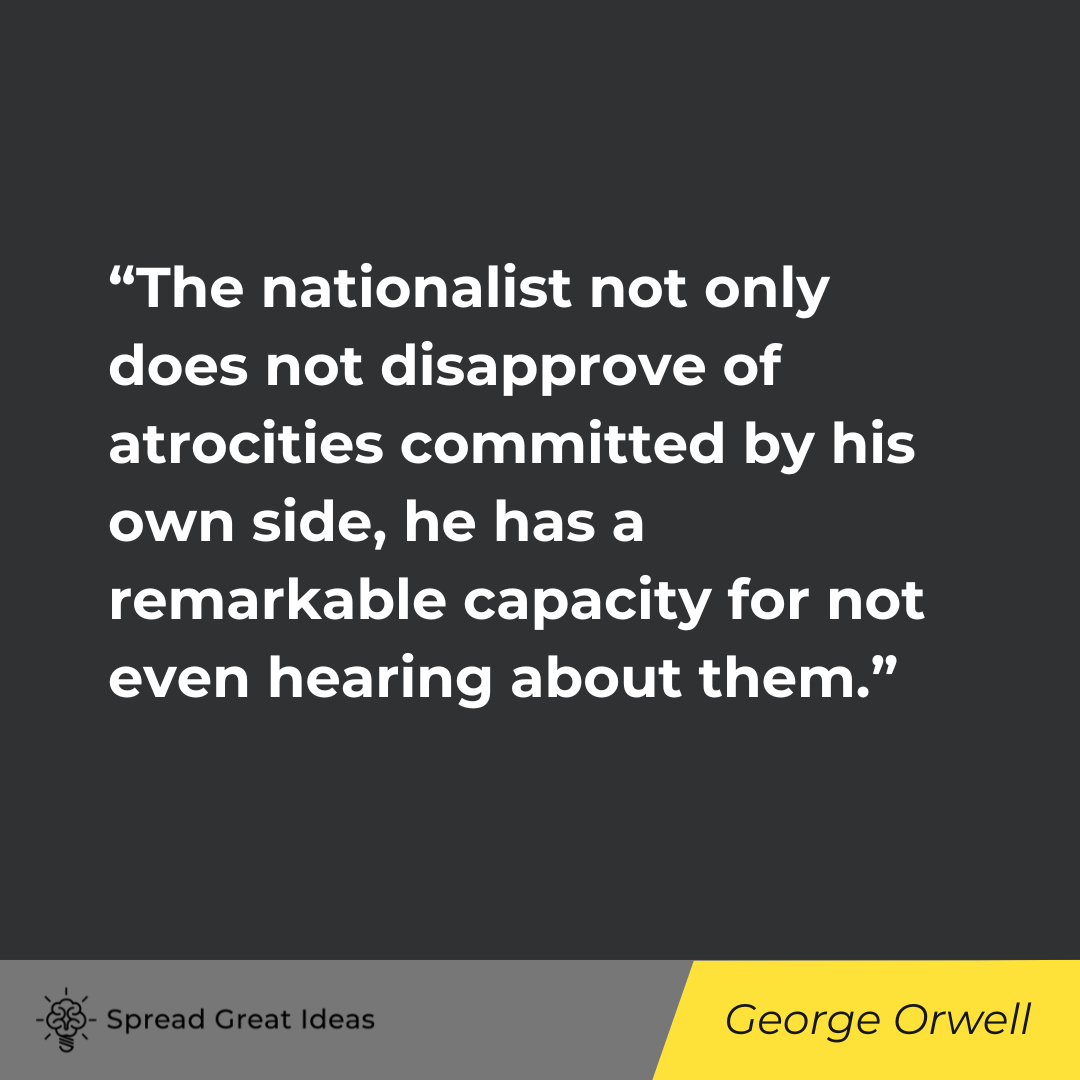
George Orwell’s quote succinctly captures the phenomenon of selective perception and moral blindness prevalent among nationalists. He suggests that individuals deeply entrenched in nationalist ideologies exhibit a remarkable ability to overlook or rationalize atrocities perpetrated by their own group. Orwell highlights the cognitive dissonance at play, wherein nationalists remain willfully ignorant or indifferent to the misdeeds of their own side. This observation serves as a caution against the dangerous consequences of unchecked loyalty and tribalism, urging individuals to remain vigilant and critical of their own allegiances. Orwell’s insight underscores the importance of moral consistency and universal empathy in evaluating human actions.
George Orwell
“For, after all, how do we know that two and two make four? Or that the force of gravity works? Or that the past is unchangeable? If both the past and the external world exist only in the mind, and if the mind itself is controllable – what then?”
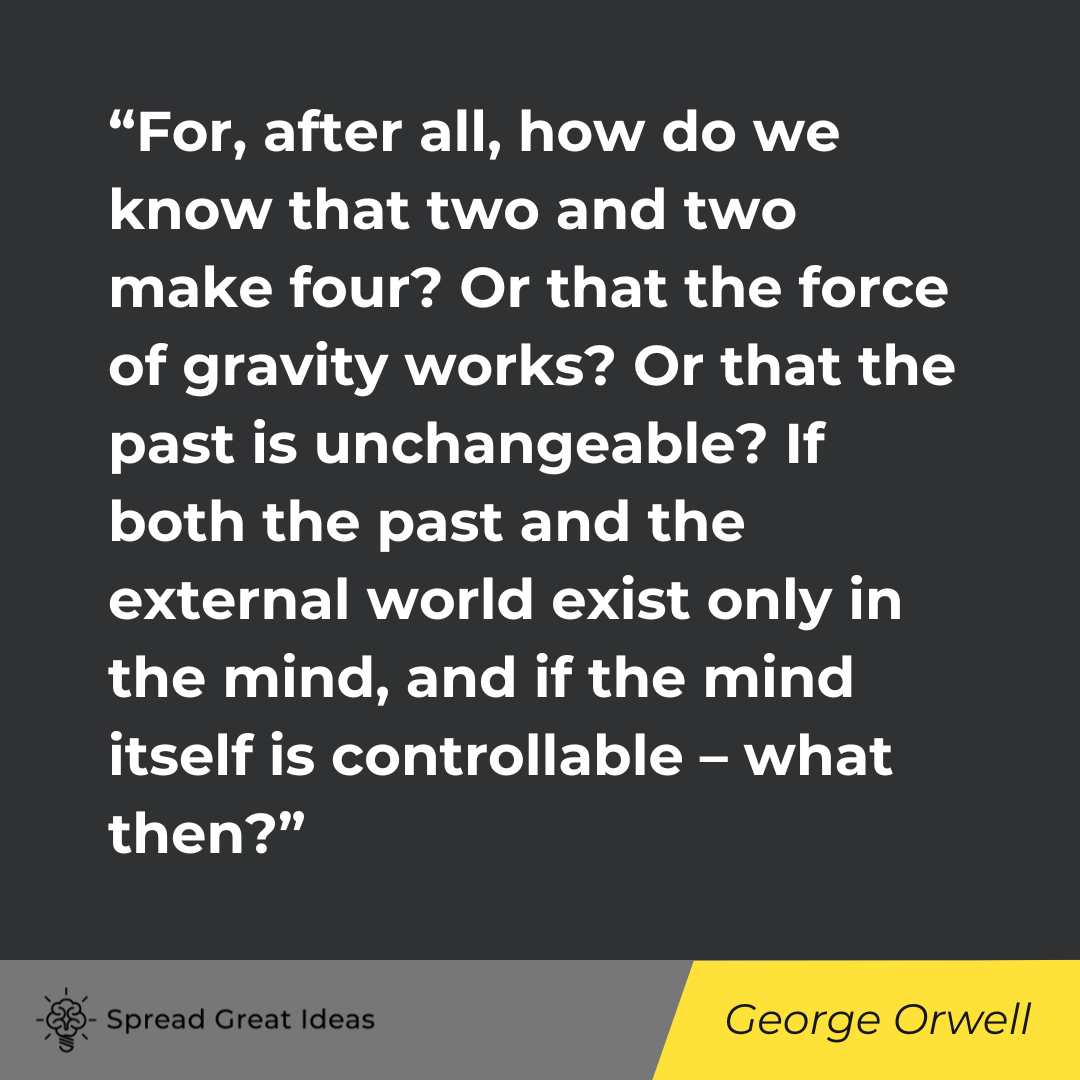
George Orwell’s quote from “1984” delves into the unsettling realm of epistemological uncertainty and the manipulation of reality. By questioning fundamental truths like mathematical principles and the laws of nature, Orwell challenges the very basis of objective reality. He introduces the notion that if both the past and external reality are merely constructs of the mind, subject to manipulation, then the very essence of truth becomes precarious. Orwell’s inquiry provokes contemplation on the nature of power and control, highlighting the profound implications of a world where reality itself can be altered at the whim of those in authority.
George Orwell
“To know and not to know, to be conscious of complete truthfulness while telling carefully constructed lies, to hold simultaneously two opinions which cancelled out, knowing them to be contradictory and believing in both of them, to use logic against logic, to repudiate morality while laying claim to it, to believe that democracy was impossible and that the Party was the guardian of democracy, to forget whatever it was necessary to forget, then to draw it back into memory again at the moment when it was needed, and then promptly to forget it again: and above all, to apply the same process to the process itself — that was the ultimate subtlety: consciously to induce unconsciousness, and then, once again, to become unconscious of the act of hypnosis you had just performed. Even to understand the word ‘doublethink’ involved the use of doublethink.”
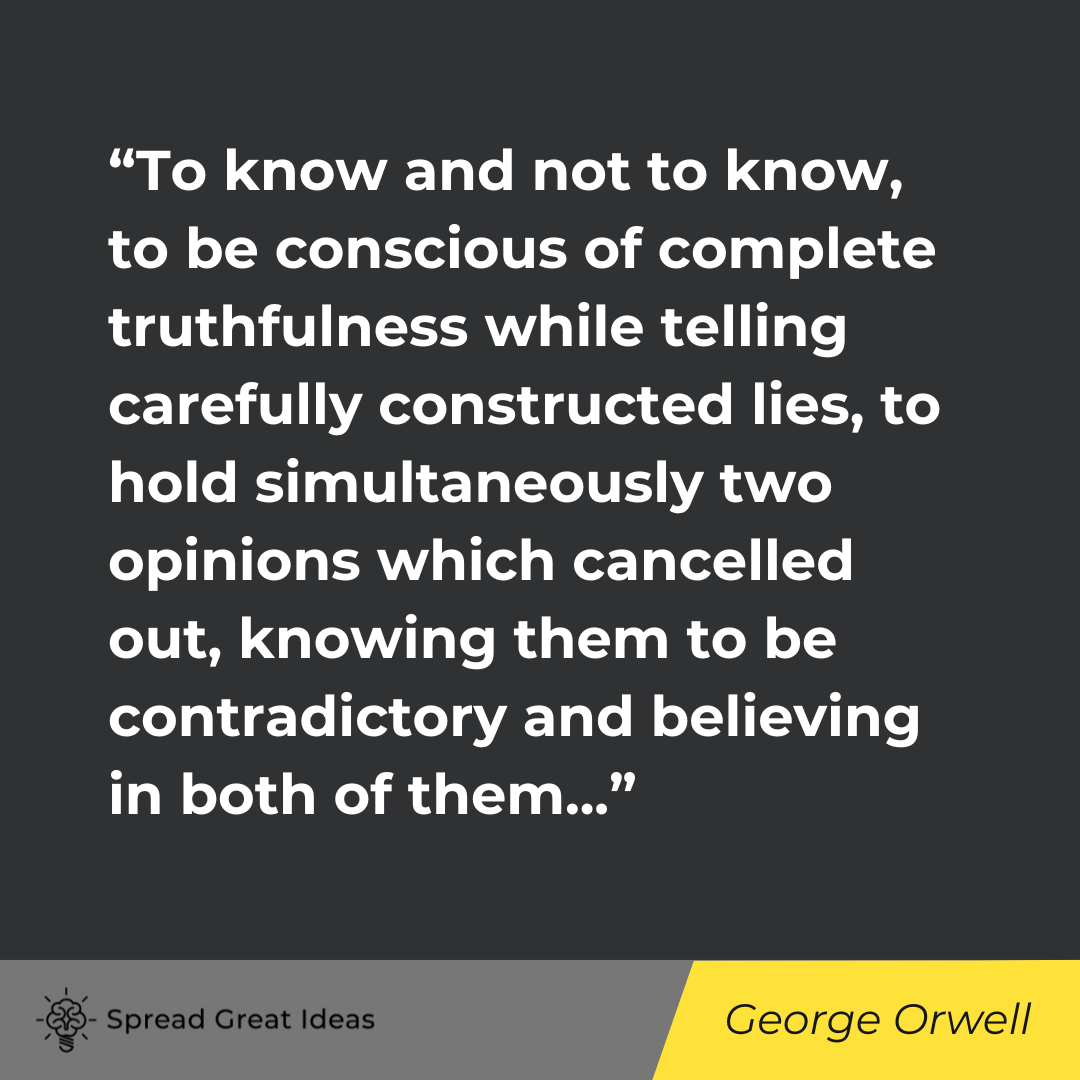
In this profound passage from “1984,” George Orwell explores the concept of doublethink, a cornerstone of the totalitarian regime depicted in the novel. He delves into the intricacies of cognitive dissonance and the manipulation of truth within oppressive systems. Orwell vividly describes the paradoxical mental gymnastics required to simultaneously hold contradictory beliefs, deceive oneself, and justify moral transgressions. Through doublethink, individuals navigate a labyrinth of self-delusion and obedience, where even the understanding of the term implicates its application. Orwell’s portrayal serves as a chilling reminder of the dangers of unchecked authority and the erosion of individual autonomy in the face of totalitarian control.
Jonathan Swift
“It is useless to attempt to reason a man out of a thing he was never reasoned into.”
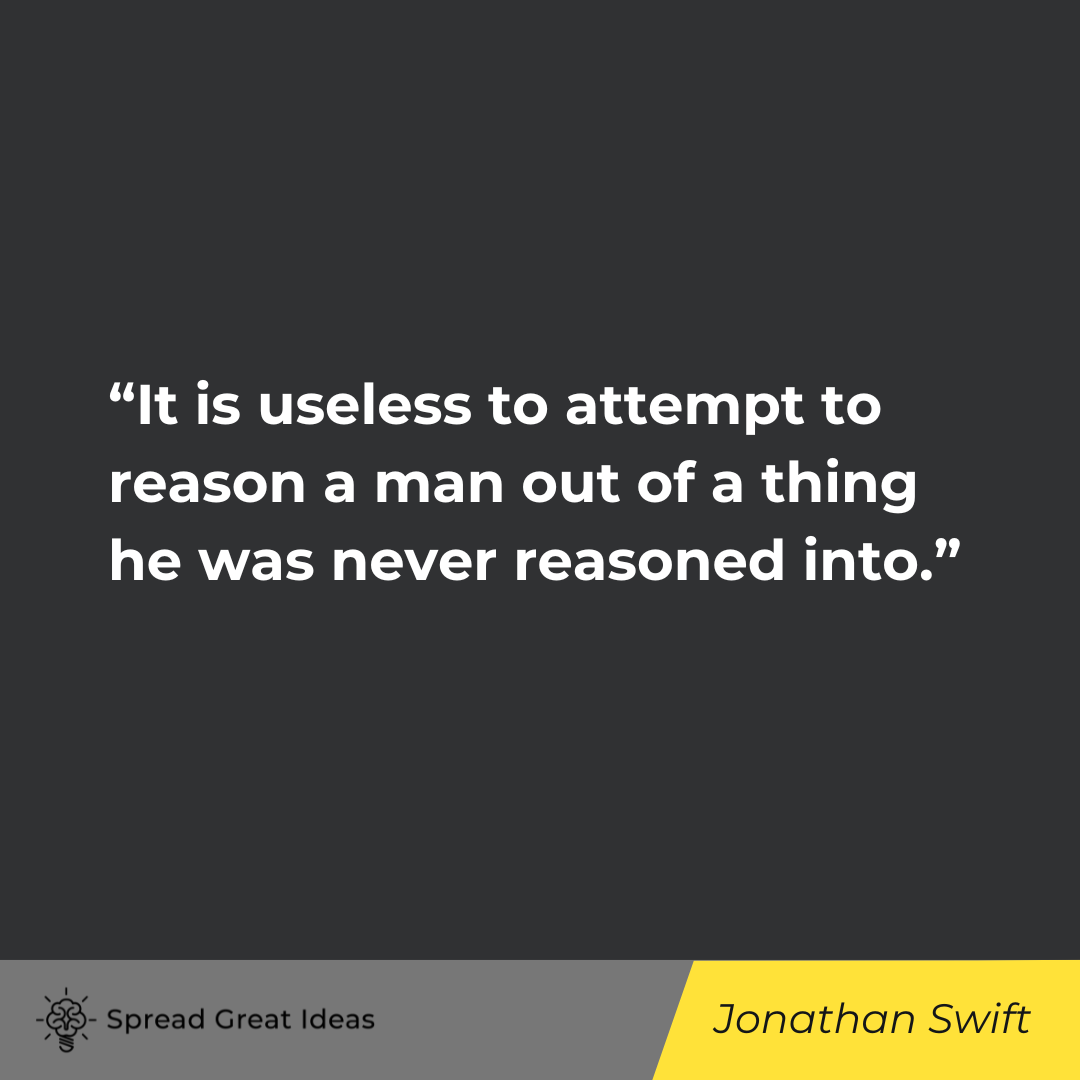
Jonathan Swift’s quote encapsulates the futility of trying to persuade someone to abandon a belief that was not formed through rational discourse. He suggests that attempting to use logic and reason to change the mind of an individual who never arrived at their belief through rational means is an exercise in futility. Instead, Swift implies that deeply ingrained beliefs, whether cultural, emotional, or ideological, are often impervious to logical argumentation. This observation underscores the complexity of human psychology and the importance of understanding the emotional and cultural factors that shape beliefs.
Karl Lagerfeld
“If you stick to something doggedly, you are off to a bad start.”
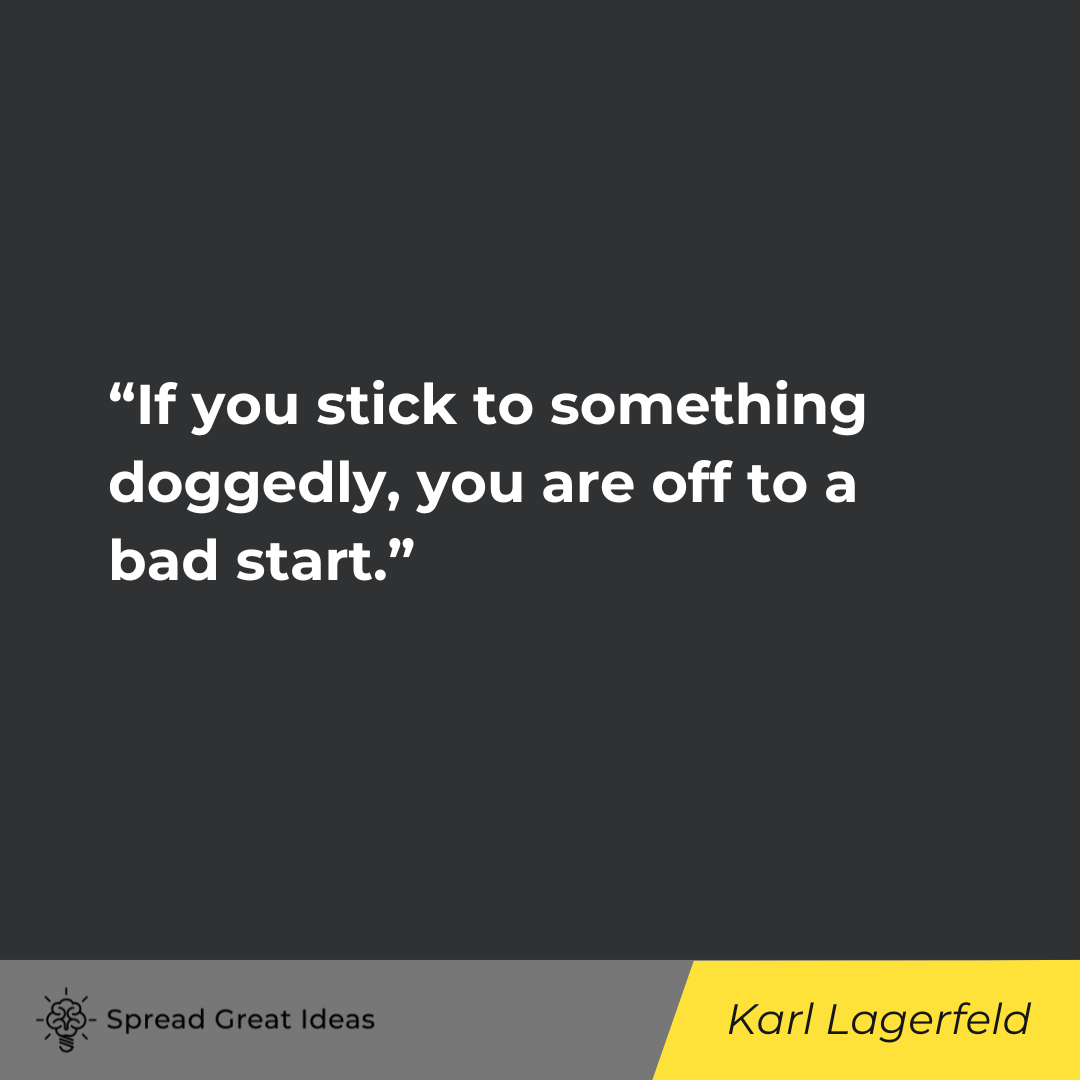
Karl Lagerfeld’s quote offers a counterintuitive perspective on persistence and determination. By suggesting that doggedly sticking to something indicates a “bad start,” Lagerfeld challenges the notion that unwavering commitment always leads to success. Instead, he implies that blindly adhering to a single path or idea may hinder one’s ability to adapt, innovate, and explore alternative approaches. Lagerfeld advocates for flexibility and openness to change, emphasizing the importance of agility and willingness to pivot in the pursuit of goals. This quote serves as a reminder to maintain a balance between persistence and adaptability in navigating life’s challenges.
Phillip K. Dick
“Reality is that which doesn’t go away when you stop believing in it.”
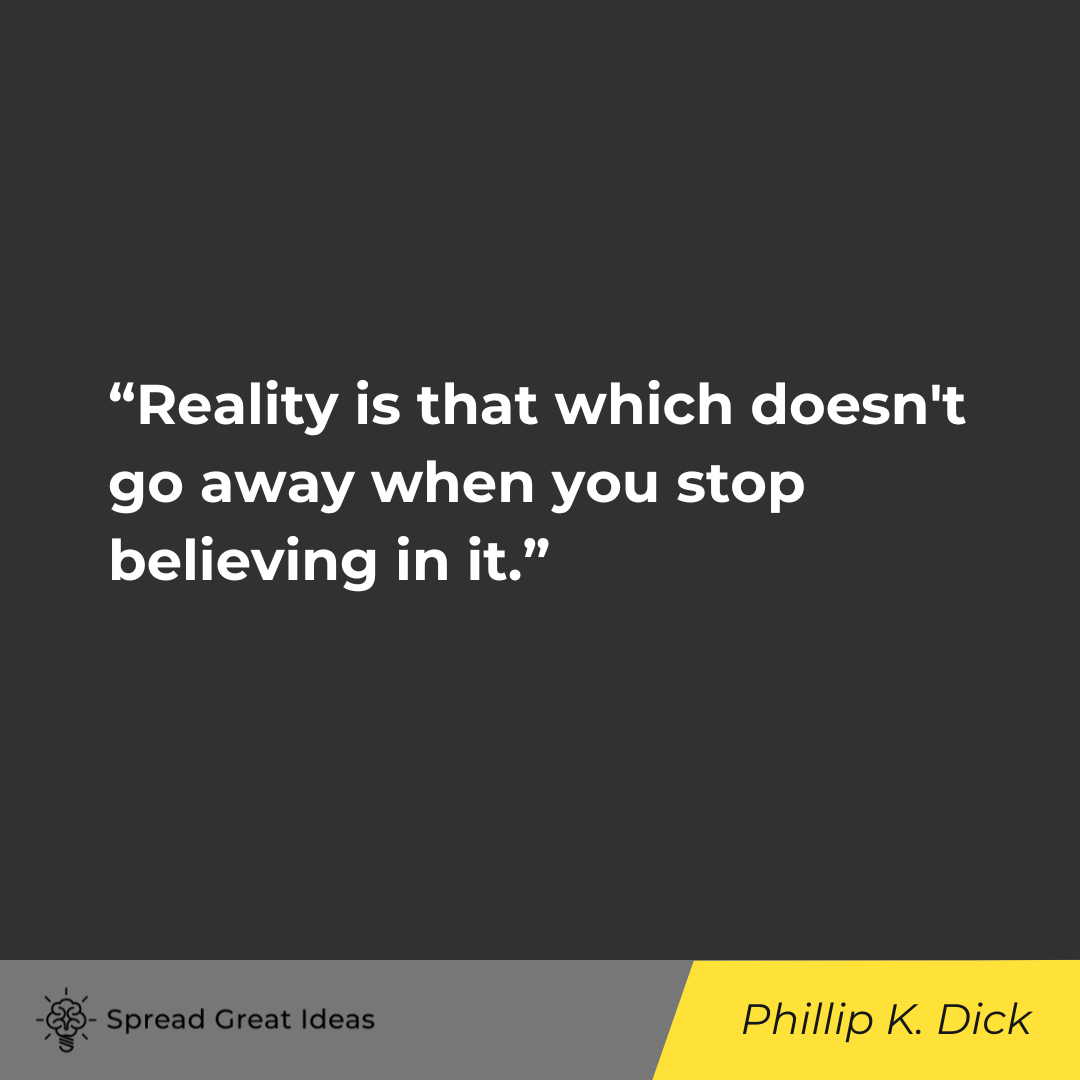
Phillip K. Dick’s quote offers a profound insight into the nature of reality. He suggests that reality exists independently of our beliefs or perceptions. Unlike fleeting illusions or subjective interpretations, reality persists regardless of whether we acknowledge or accept it. By defining reality as that which endures beyond our individual perspectives, Dick challenges us to confront the objective truths that exist beyond our subjective experiences. This quote serves as a reminder of the importance of acknowledging and grappling with the tangible aspects of existence, even when they may be uncomfortable or inconvenient to our preconceived notions.
John F. Kennedy
“For the great enemy of the truth is very often not the lie-deliberate, contrived and dishonest- but the myth- persistent, persuasive, and unrealistic. Too often we hold fast to the clichés of our forebears. We subject all facts to a prefabricated set of interpretations. We enjoy the comfort of opinion without the discomfort of thought.”
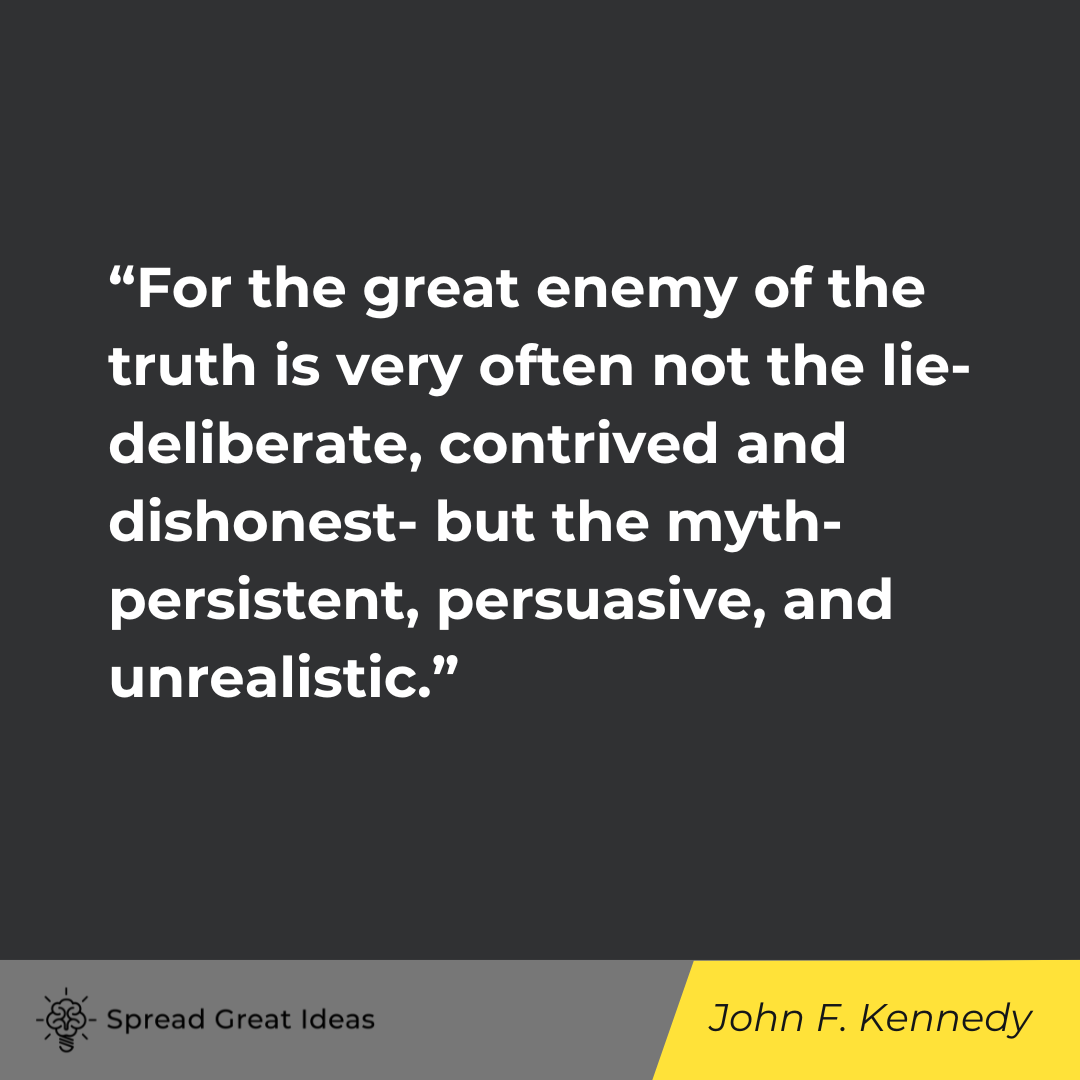
In this poignant quote, John F. Kennedy discerns between the blatant dishonesty of lies and the insidious influence of persistent myths. He highlights how deeply ingrained myths, though not deliberately deceitful, can distort truth more effectively. Kennedy critiques the human tendency to cling to inherited beliefs, preferring the comfort of familiar opinions over the challenge of critical thinking. By cautioning against the uncritical acceptance of clichés and prefabricated interpretations, he urges individuals to confront uncomfortable truths and engage in thoughtful examination. Kennedy’s words serve as a call to intellectual honesty and the pursuit of genuine understanding amid the allure of comforting illusions.
James Wolcott
“The lies the government and media tell are amplifications of the lies we tell ourselves. To stop being conned, stop conning yourself.”
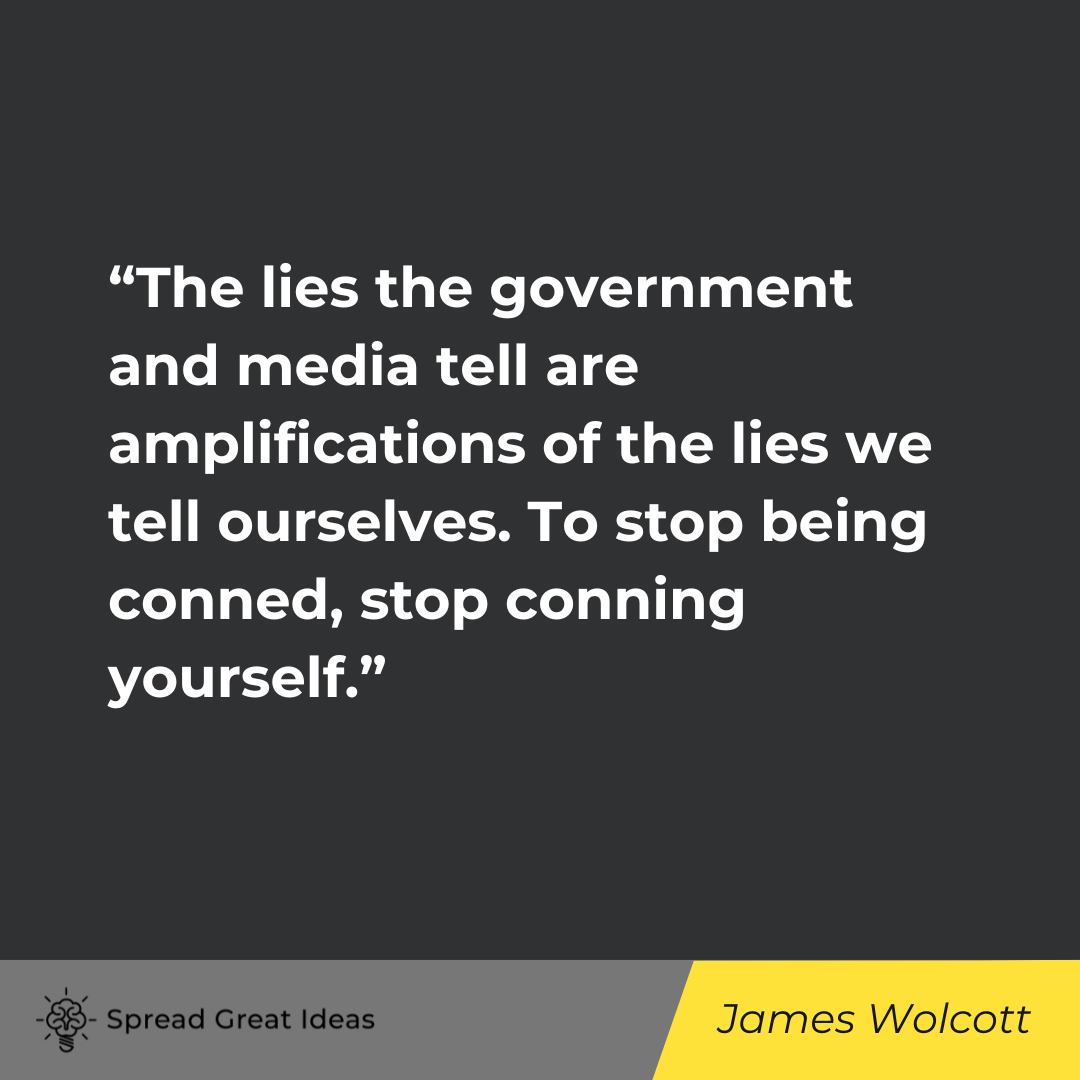
James Wolcott’s quote draws attention to the symbiotic relationship between societal deception and personal self-deception. He suggests that the falsehoods propagated by government and media are often reflections or amplifications of the lies individuals tell themselves. By acknowledging this dynamic, Wolcott challenges readers to break the cycle of deception by cultivating self-awareness and honesty. He implies that by refusing to deceive ourselves, we can become less susceptible to manipulation and falsehoods from external sources. Wolcott’s quote serves as a call to introspection and critical self-examination as a means to resist being misled and to foster a more truthful society.
Sam Harris
“If someone doesn’t value evidence, what evidence are you going to provide to prove that they should value it? If someone doesn’t value logic, what logical argument could you provide to show the importance of logic?”
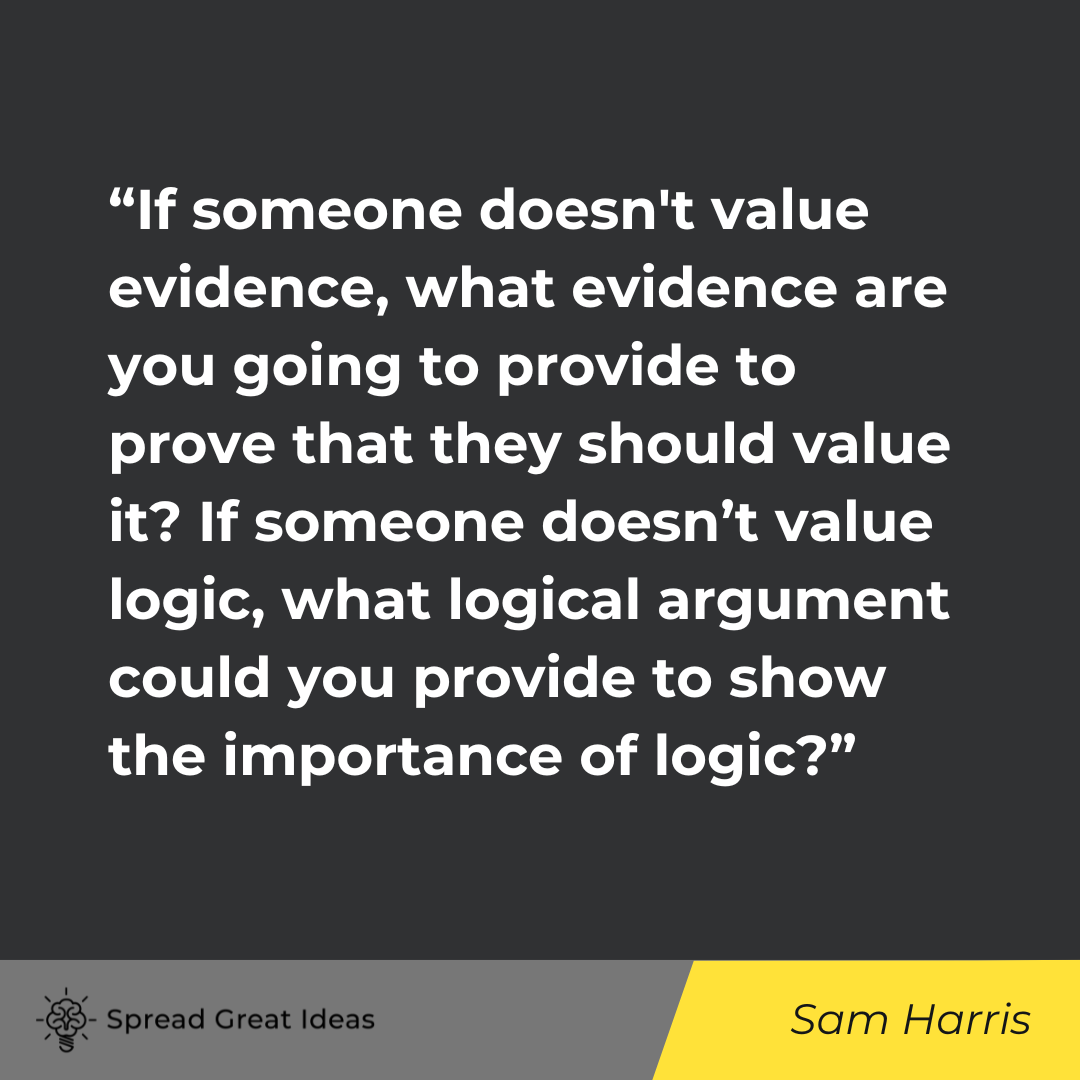
Sam Harris’s quote succinctly highlights the paradoxical challenge of reasoning with individuals who dismiss the very foundations of reason itself. He questions the effectiveness of presenting evidence or logical arguments to those who refuse to acknowledge their significance. By illustrating the circularity of attempting to persuade someone to value evidence or logic without already valuing them, Harris underscores the inherent difficulty in engaging with individuals who reject fundamental principles of rational discourse. This quote serves as a poignant reminder of the limitations of discourse in the face of entrenched beliefs that reject evidence and logic.
Blaise Pascal
“People almost invariably arrive at their beliefs not on the basis of proof but on the basis of what they find attractive.”
– Blaise Pascal, De l’art de Persuader
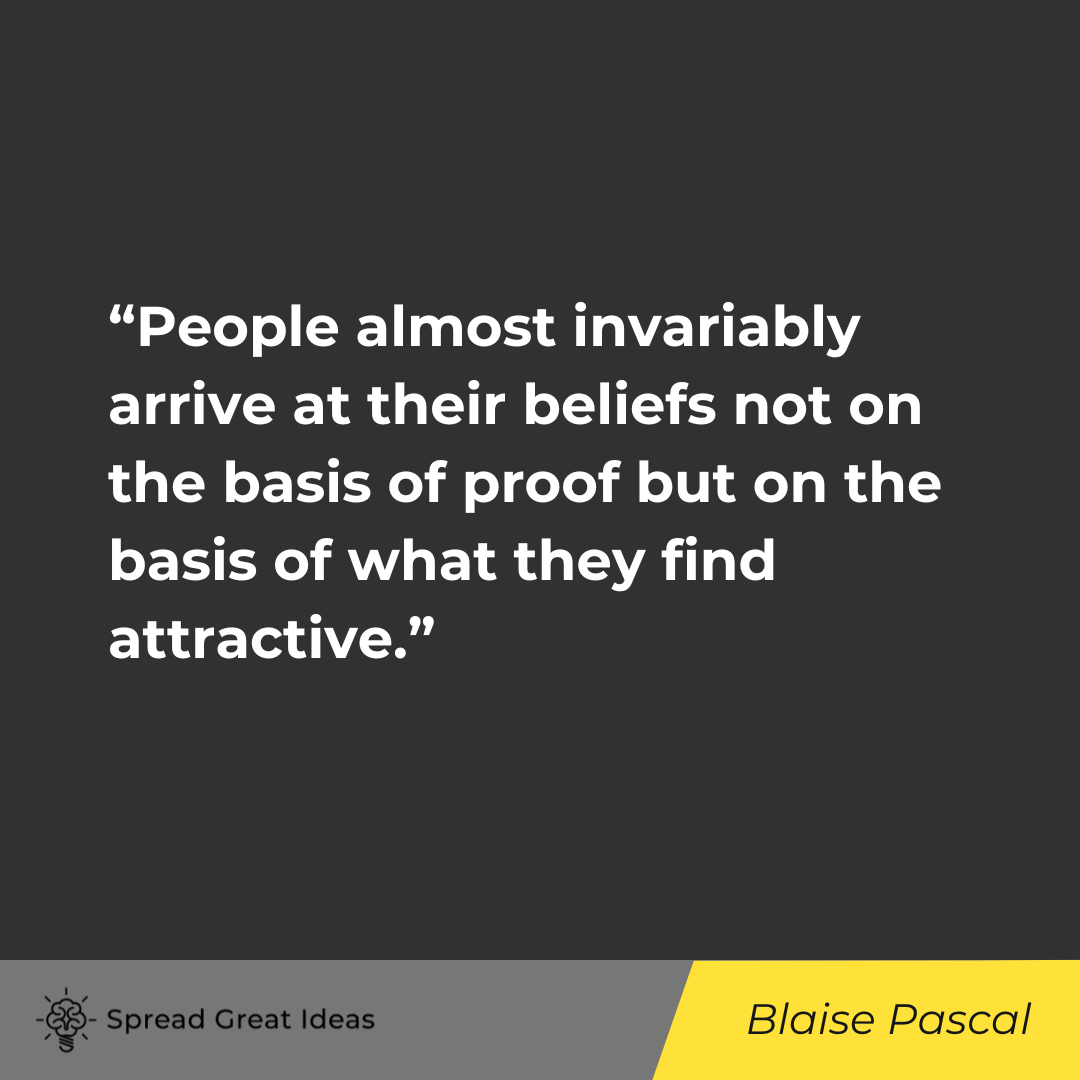
Blaise Pascal’s quote delves into the psychological underpinnings of belief formation, suggesting that personal biases and preferences often outweigh empirical evidence. He observes that individuals tend to adopt beliefs that resonate with their desires or inclinations rather than those supported by objective proof. Pascal’s insight highlights the complex interplay between emotion and reason in shaping human cognition. By emphasizing the role of attractiveness in belief formation, he challenges the assumption of rational decision-making and underscores the subjective nature of truth. This quote serves as a reminder of the importance of introspection and critical analysis in navigating the complexities of belief.
Jim Barksdale
“If we have data, let’s look at data. If all we have are opinions, let’s go with mine.”
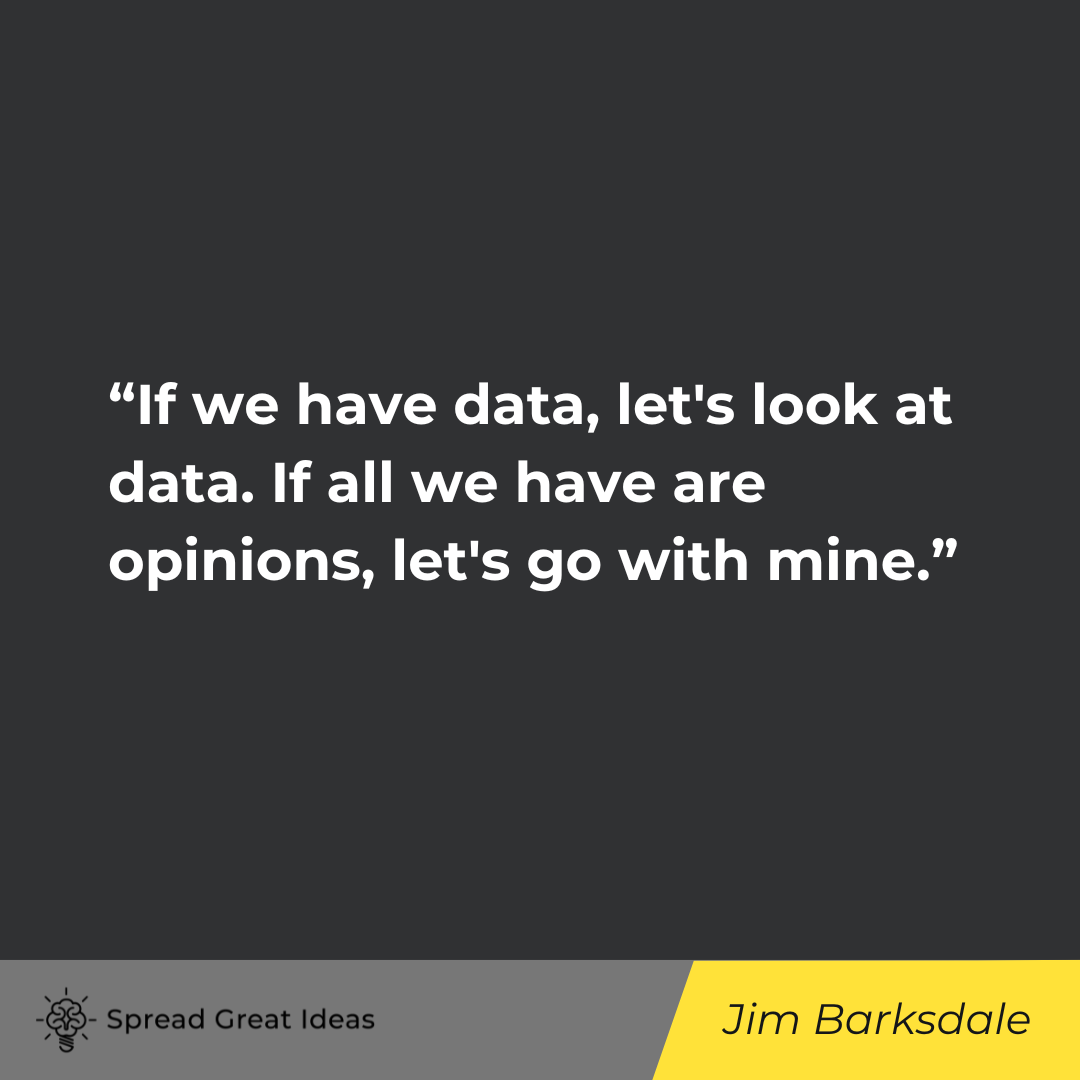
Jim Barksdale’s quote humorously underscores the importance of relying on data rather than personal opinions in making informed decisions. He advocates for a data-driven approach, suggesting that objective information should guide choices and actions. However, Barksdale playfully acknowledges the common inclination for individuals to prioritize their own opinions over facts when data is lacking. This tongue-in-cheek remark highlights the tendency for subjective biases to influence decision-making processes. Ultimately, the quote serves as a lighthearted reminder of the value of evidence-based reasoning and the pitfalls of succumbing to personal biases in the absence of concrete data.
Daniel Patrick Moynihan
“Everyone is entitled to his own opinion, but not to his own facts.”
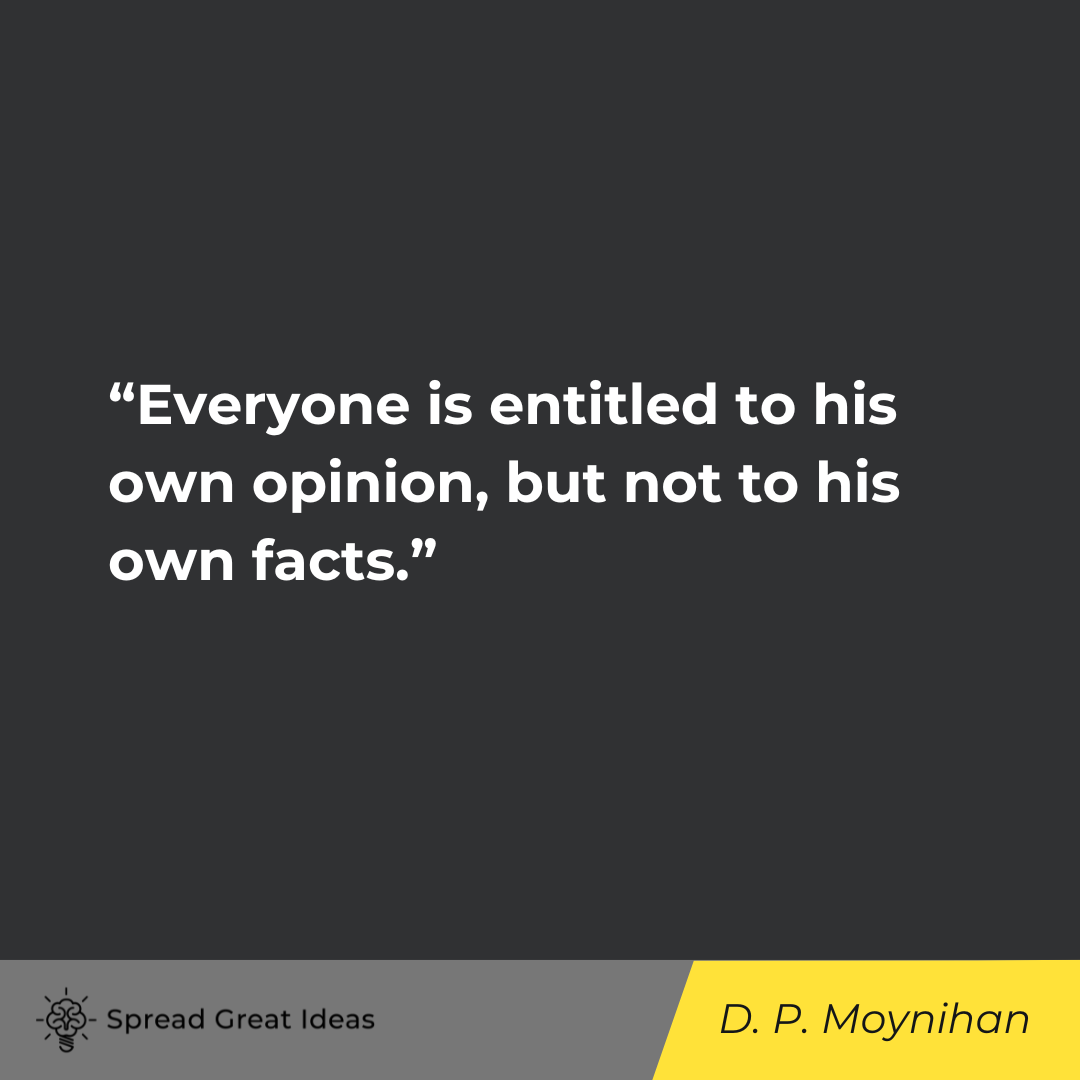
Daniel Patrick Moynihan’s quote succinctly encapsulates the distinction between opinions and facts in discourse and decision-making. He emphasizes the principle that while individuals have the right to hold their own opinions, they are not entitled to invent or manipulate facts to support those opinions. Moynihan’s assertion highlights the importance of basing arguments and policies on objective, verifiable information rather than subjective interpretations or fabrications. This quote serves as a reminder of the necessity for intellectual integrity and accountability in public discourse, urging individuals to acknowledge and respect the boundaries between subjective perspectives and empirical realities.
